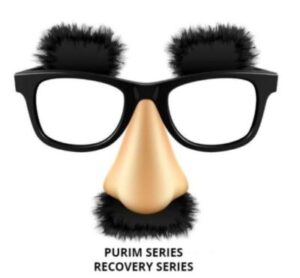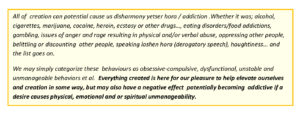
03 Mar PURIM; SANCTIFY OR SACRILEGE

PURIM;
SANCTIFY OR SACRILEGE… WHY DRINK ON PURIM?
Inspired by the teaching of HaRav Yitzchak Ginsburgh and Rabbi Moshe Genuth
(excerpt: An Approach to Recovery through the Wisdom of Chassidut, Kabbalah and the 12 Steps of Recovery- L. Lax)

Our actions are eternal
Each moment of each day every Jew has the potential to bring sanctification to himself and the world, and in doing so can draw closer to G-d.
We do this by revealing concealed sparks of holiness, appropriately igniting them, and elevating ourselves and all Creation.
The mitzvot are a conduit to receive and transmit spiritual consciousness through the mechanisms of the physical and spiritual realms. A purpose of the mitzvot, and the dedicated mitzvot of the chagim (holidays), is to provide guidelines for our greatest success.

‘Purim may arguably be one of the most desecrated days on the Jewish calendar’.
One of the most popular questions about Purim is ‘why drink to get drunk on Purim?’ Perhaps the following will offer an explanation…
Beyond the common celebration most people know as Purim, the deeper insights of the Festival of Purim is a holiday that beckons us to take a look at our yetser hora (evil inclination/desire). The yetser hora ‘unbridled’ however causes a disharmony often manifesting in repeated extreme or unmanageable behavior that may for some be categorized as addiction.
Perhaps some of the most revealed examples of the yetser hora unbridled can be found amongst those who have substance or behavioral addictions. If you were to ask someone suffering from addiction, in recovery from addiction, or those individuals yet to admit their addiction how they ended up in their present state of unmanageability, you would often find that almost every single person would say ‘they believed that they had ‘it ‘(their yetser hora / desire / addiction) under control’ …, until they hopefully reached an awareness that they did not have control.

The most common reason as to why a person begins to use substance is that they may be inherently spiritually sensitive and/or may have other issues that cause them to feel discomfort; existential angst and angst of the ego… disharmony. This may often be unconscious. Through the discomfort or disharmony to cope with life in a healthy way, a person may have found interim but damaging relief… a counterfeit comfort through the use of substance. What we should know is that individuals with issues of addiction often have great spiritual potential. There is help available for the addict and the family and friends of the addict.
A person in recovery from substance abuse, behavioural issues, medical or other psychological issues, or drug interactions should not drink alcohol on Purim or any other time. It is recommended to avoid Purim Parties that have alcohol. You may find that there may be ‘Recovery Friendly’ Purim Parties. Don’t compromise.., talk to an expert!
All those with substance or behaviour problems believed at some point ‘ there was no problem’. We all have that built in mechanism called ‘denial’ which manufactures the mask (klipot / barrier) that protects our soft and squishy, ever so vulnerable ego (self), and thereby compromises our potential to recognize our deficiencies and grow in a spiritually healthy way.
We know that when the damaging substance or behavior is removed from the equation, the process of healing can begin. This is the first step is to stopping the negatively impacting behavior. This begins the process of the removal, or the peeling back of the layers of the mask(s) created by the damaging desire(s). However, in preparation of the removal of the mask(s), just like building a house, there needs to be a plan for laying the foundations and proceeding with construction. That plan for success includes a plan of action is called … tshuvah, the return to a pristine or rectified state of being.
Each one of us has a mask of many layers we have managed to acquire through our lives. Some people have learned to mask their ‘authentic self’ to the point of unmanageability until the physical and spiritual consequences are overwhelming (as is the case with the addict). There are many others (addicts or others) who have yet to discover just what parts of their life are unmanageable or compromising to their relationship with themselves, their family and friends, and ultimately, their relationship with G-d. These challenging gifts of character development are given to help us rise to the challenge and in so doing inspire us to earn a closer relationship with Hashem through the process of tshuvah (return) and tikun (rectification).
Drinking to get drunk is considered to be a chet (transgression) if it causes us to block out G-d’s light and effectively removes us from our ‘authentic’ relationship with G-d… thereby putting a barrier (klipot) between ourselves and G-d.
So the question remains, ‘can drinking to get drunk on Purim be a good thing’? The answer is surprisingly yes and no. Jewish wisdom describes two consequences of drinking; “wine of joy” and “intoxicating wine.”
A person who’s state of intoxication may cause G-d’s Light to be blocked , may be considered a Chilul Hashem (a person whose act of rebellion [transgression] effectively blocks out G-d’s Light – His Goodness). Whether it is the use of substance or behavior, the spiritual and physical consequences of compromising our relationship with G-d are eminent. Drinking to get drunk on Purim however is in a category unto itself, and must be carefully understood if one is going to strive for the experience of d’vacoos (to stick, to connect, to have an intimate reciprocating relationship with G-d) . This is an issue that should be discussed one-on-one with a Rav in detail.
In brief, it is said that a goal of drinking on Purim may be to drink until you can’t tell the difference between ‘Cursed be Haman’ and ‘Blessed be Mordechai’… each having the same equal gematria of 502… but what does that actually mean?…
When a person has immersed himself in the study of Torah and has committed him/herself to the development and refining of one’s character, he then must also have a plan to follow to succeed. Part of this plan may include ‘Holy Drinking’. For those who may drink, drinking of the wine in a Holy way may help reduce his inhibitions, and will allow the concealed (masked) weaknesses of character and one’s yetser hora, maybe revealed. Success to ‘holy drinking’ requires mindful preparation in far advance that includes being immersed in Torah study, and delving into ones ‘cheshbon hanefesh’ (personal character inventory)
When a person has reached a state of spiritual loftiness, the powerful positive sparks of holiness concealed within the darkness of ‘cursed be Haman’ become revealed and ‘cursed be Haman. and blessed be Mordechai’ are ‘equal in gematria and purity’, and become unified as one; a state of Yichud (Oneness). The darkness i.e. impurity of evil no longer exists. This is a Messianic and Kabbalistic concept. All negativity(evil) has been rectified; All is One, All is G-d.
‘Equal to the effort is the reward’ and so the potential reward that is available on Purim, like any other opportunity to grow and come close to Hashem requires effort. Everything Hashem gave us has the potential for both good and evil depending on our connection with the Almighty and how we use all that this world has to offer to the fullest potential. Through our positive actions we can bring in G-d’s Light… His Goodness, or by a negative action or our failure to act, we can block out G-d’s Light causing darkness and evil to proliferate.
‘The wine goes in and the secrets come out’. If one wants to become drunk with wine to accomplish the available connection , one should be immersed in Torah study and make intense preparation for this mitzvah. Part of his preparation would include doing a daily cheshbon hanefesh (a personal inventory), and having a plan in place to take action immediately following what is revealed to him during this time of Joy.
It is only through careful and thorough preparation that one may be able to grasp, understand and grow in his tshuvah and tikun from that which may be revealed during the period of ‘joy’ . It is then that an individual will then have appropriately performed this Purim mitzvah and can truly be considered a Kiddush Hashem (a sanctification of G-d’s name).
However, there is another opinion as stated in the Shulchan Aruch (for those who may drink in a holy way ); ‘If you are not going to get intoxicated (as in a state of joy), you should drink more than you usually do and go to sleep. ‘…Once you are asleep, you cannot tell the difference between cursed be Haman and blessed be Mordechai… If you know that as a result of drinking you will, G-d forbid, ignore a mitzvah, a bruchah, or a prayer, or that drinking will lead to lightheaded exuberance, it is better not to become drunk.’
Another understanding of ‘… you should get intoxicated (as in a state of joy), on Purim’ can also be translated as ‘…you should become intoxicated ‘on’ – (alternatively) – ‘with’ Purim. The indication in the latter [as in with Purim] is that one should become intoxicated spiritually with the’ spiritual joy’ of Purim.
Kabbalistic Insight
Wine is one of the ‘7 liquids of the Torah’ and is associated with the spiritual emanation of Gevurah-Might. We may recall Pharaoh who’s might caused him to ‘harden his heart’. He acquired a husk- shell (klipot) that caused him to believe in his own ‘self'(his ego) detached from G-d’s Will. A hardened heart causes a loss objectivity.
A person who desires objectivity through and growing relationship with G-d must become mindful of the klipot (barrier/shell) of his heart as being an obstacle to his growth. G-d is the greatest objective being and a relationship with Him is the antidote for our ‘klipot or blockages’. G-d is the remedy to our subjectivity and the path to our greater objectivity.
Wine, especially red wine is considered to possess the power of gevurah(might). It is only on ‘this day at this time of Purim’ that the commentaries speak of the use of wine as might-gevurah, that can be used break through the shell-klipot-blockage of the might over ones heart ‘if one is appropriately spiritually focused’.
The Torah and teachings expound the use of loving kindness , however on this day this opinion holds that one can use might against might to break through the klipot of the heart and have revealed to him the secrets within.

When the inappropriate consuming of wine and intoxication occurs for an individual, the results can be damaging. Where the inappropriate consuming of wine and intoxication occurs in large numbers, the results can be disastrous.
The purpose of Purim is to sanctify ourselves, Not to be sacrilegious.
I hope these insights will help you to elevate your Purim experience and your everyday life experience in a kosher pure way, by helping to remember that the basic choice our free-will has to offer is to bring G-d into this world, or by our default cause G-d to be blocked out…. G-d forbid a Chilul Hashem.
Sanctify or Sacrilege
In simplest terms, the power of Purim is to reveal the concealed. We must be prepared receive and embrace that tremendous gift from G-d. Drinking to get drunk on Purim can be an enlightening , sanctifying experience when done with the most appropriate spiritual focus. Or, it can be sacrilegious if one repeats the self pleasuring behavior of the original chet as it was at the time of the Megilah should one become intoxicated for self pleasure.
To fulfill the mitzvah without transgression we must keep in mind that to be intoxicated can have many different meanings. Please consider these thoughts for yourself , your family, your friends and your community.
Have a Leibedik Purim,
Leib Getzel (Lawrence) Lax
Addictions and Counseling (Hnrs)
www.LawrenceLax.com
LawrenceJLax@gmail.com